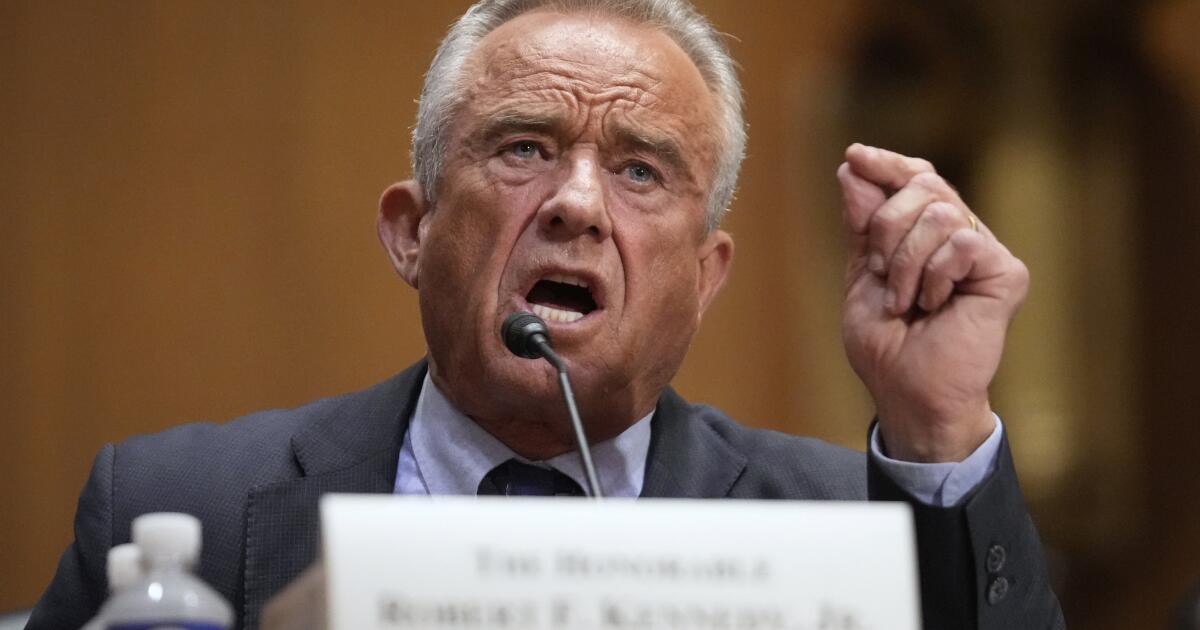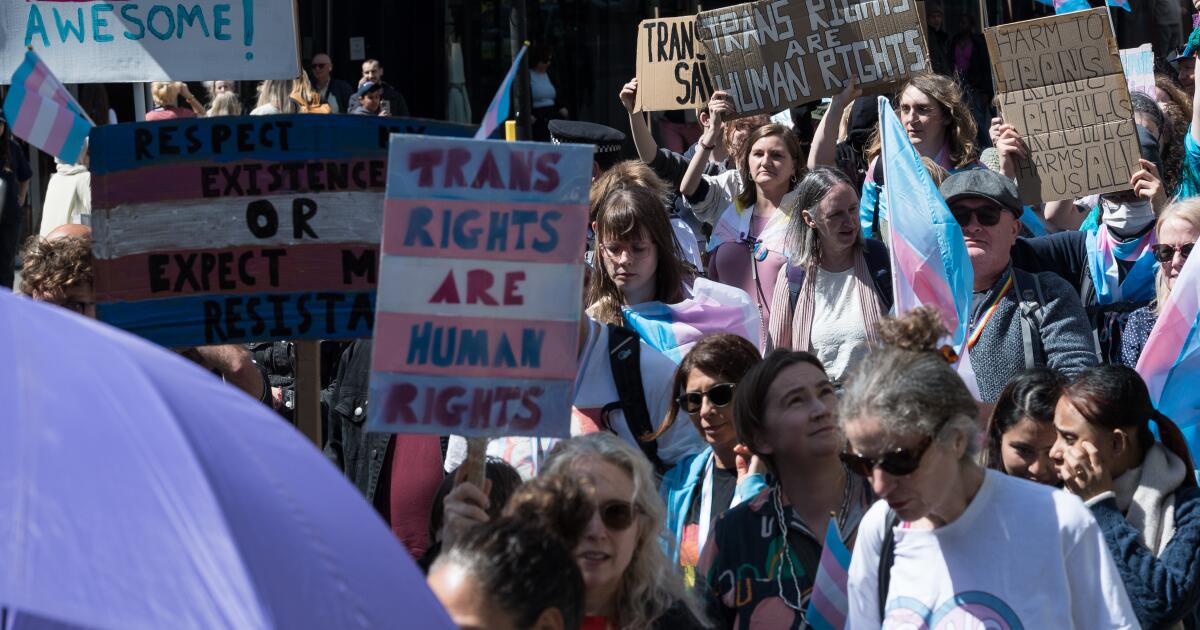Hawaii’s governor, a career physician, has a message for Trump on RFK Jr.
WASHINGTON — Warning signs of eroding trust in public health under Health and Human Services Secretary Robert F. Kennedy Jr. have prompted growing calls for his resignation from Democratic lawmakers, career public servants and his own family. But one doctor-turned-governor has other ideas.
Newsletter
You’re reading the L.A. Times Politics newsletter
George Skelton and Michael Wilner cover the insights, legislation, players and politics you need to know in 2024. In your inbox Monday and Thursday mornings.
You may occasionally receive promotional content from the Los Angeles Times.
Democratic Gov. Josh Green of Hawaii, a career emergency room physician, has privately pressed the Trump administration to create a new post for Kennedy that would remove him from responsibility over vaccines, while allowing him to focus on areas of public health where his theories enjoy greater scientific backing — on nutrition, pesticides and chronic disease, the governor said in an interview.
“They’ve simply gone too far, and it’s not the president who’s gone too far. It’s Secretary Kennedy,” Green told The Times, suggesting two Republican appointees — Mehmet Oz, Trump’s current administrator for the Centers for Medicare & Medicaid Services, and Jerome Adams, former U.S. surgeon general during Trump’s first term — as potential replacements he would publicly support.
“We’re entering flu season,” Green said. “These viruses, if people aren’t vaccinated, will cause large numbers of excess fatalities, and there will be no one to look to for responsibility other than the secretary of Health.”
“I recommended it to people at the highest levels, and I have worked hard to maintain a constructive relationship with the current administration,” Green added. “It’s up to them to make this call. But you can see now that it’s very possible.”
A tense public hearing on Capitol Hill last week laid bare bipartisan concerns over Kennedy’s vaccine skepticism, with three Republican senators — Bill Cassidy of Louisiana, John Barrasso of Wyoming and Thom Tillis of North Carolina — expressing alarm at turmoil within the Centers for Disease Control and Prevention over vaccine guidance and accessibility.
Kennedy, at the hearing, stated without evidence that COVID-19 vaccines had caused harm and death, and questioned CDC statistics on how many lives they had saved.
“The president is not pleased deep down with this as a distraction,” Green added. “It is not helpful to any administration to have outbreaks.”
A Western health alliance
Without changes in Washington, Hawaii will join a burgeoning alliance of western states to issue independent public health guidance, Green said.
The West Coast Health Alliance, formed this month by California, Washington and Oregon, will issue recommendations that rely on many of the career scientists and experts dismissed by Kennedy in recent months, as well as organizations such as the the American Academy of Pediatrics and the American Heart Assn.
Hawaii Gov. Josh Green shown during a black-tie dinner at the White House in 2024.
(Anna Rose Layden / Getty Images)
Kenneth Fink, director of the Hawaii Department of Health, will be the state’s day-to-day representative to the alliance. But “as a physician, I’m also available to the group, to help bring other experts from across the country into the fold,” Green said.
The collective has not yet decided whether to set up a formal alternative to the CDC’s Advisory Committee on Immunization Practices, or ACIP, a vaccine advisory panel of experts whose entire membership was fired by Kennedy and replaced by vaccine skeptics.
But many experts are already in touch with Green and other members of the alliance, which has begun discussing how to structure itself.
Green, 55, will serve next year as head of the Western Governors Assn., representing 19 states west of the Mississippi River, and is encouraging other states to join the effort, including those led by Republicans. “I really do want to take public health out of politics,” he said.
Already, Green and his counterparts have discussed executive actions they can take at the gubernatorial level, in coordination across the alliance, to protect vaccine access.
Vaccines pushed off-label by the FDA may need special authorization for access, for example. States may also need to fund vaccine access to individuals who fall outside new federal recommendations for eligibility.
Hawaii already anticipates having to spend $15 million in state dollars to ensure everyone who wants a COVID booster shot can receive one, supplementing federal funding, the governor said.
“There are going to be some needs to use executive orders from us as governors,” Green said. “I will be doing that. And I’ll be recommending that to my colleagues in the alliance.”
A national security threat
In May, Green traveled to Washington to testify before a Senate subcommittee where Republican lawmakers were holding a hearing titled, “The Corruption of Science and Federal Health Agencies.” Its main target was the administration of COVID vaccines.
Green was the sole defender of the pandemic response on a six-member panel.
“As a physician, I cared for patients all the way through the COVID pandemic, and we would have had thousands of additional deaths if we didn’t vaccinate our state,” he said. “This is no joke.”
“Mr. Kennedy referred to his Senate hearing as theater,” he added. “It’s not theater when you’re an ER doc and you’re caring for patients and having to intubate them.”
Hawaii emerged from the pandemic with the lowest mortality rate of any state in the union, and one of the highest vaccination rates. Green served as lieutenant governor at the time.
Health and Human Services Secretary Robert Kennedy Jr. testifies before the Senate Finance Committee.
(Andrew Harnik / Getty Images)
A CDC analysis presented in June, under Kennedy’s leadership, found that COVID vaccines “have been evaluated under the most extensive safety monitoring program in U.S. history,” rejecting conspiracy theories around their association with a range of alleged side effects.
The CDC has found a rare but statistically significant number of cases of myocarditis, or inflammation of the heart, in males between ages 18 and 24 who have taken the shots, 90% of whom experience full recoveries and resulting in no known deaths.
Under Kennedy, for the first time since its introduction, the COVID vaccine has become difficult to find. The FDA has revoked emergency-use authorization for the shots and is recommending them only for individuals over 65 years old, or those over 5 with underlying health conditions.
The Trump administration has also gutted funding of the National Institutes of Health and cut $500 million in funding for mRNA vaccine research, a development that Green called an imminent risk to national security, allowing countries such as China to dominate access to critical technologies during future public health emergencies that could leave Americans vulnerable.
Trump himself has indicated concern, last week telling reporters, “I think you have to be very careful when you say that some people don’t have to be vaccinated. It’s a very, you know, it’s a very tough position.”
“You have vaccines that work. They just pure and simple work,” Trump added. “They’re not controversial at all. And I think those vaccines should be used, otherwise some people are going to catch it and they endanger other people. And when you don’t have controversy at all, I think people should take it.”
Green saw Trump’s remarks as a sign of a potential shift.
“I think that Secretary Kennedy is doing our country a disservice, and frankly, he’s doing the president a disservice,” Green said. “This is going to hurt the president of the United States and his administration.”
What else you should be reading
The must-read: Barabak: ‘I think it was recklessness’: Harris bashes Biden for late exit from 2024 campaign
The deep dive: California has a strict vaccine mandate. Will it survive the Trump administration?
The L.A. Times Special: Fewer jobs, AI threats and rising healthcare costs. A tough role for SAG-AFTRA’s new leader
More to come,
Michael Wilner
—
Was this newsletter forwarded to you? Sign up here to get it in your inbox.


